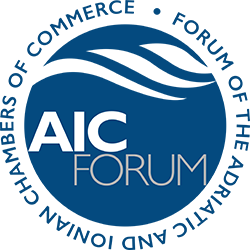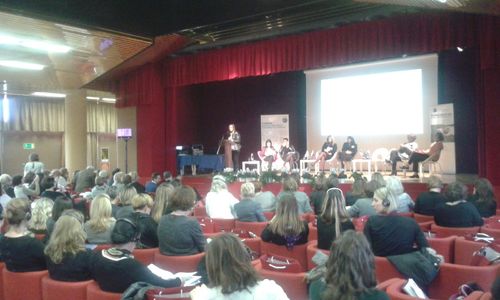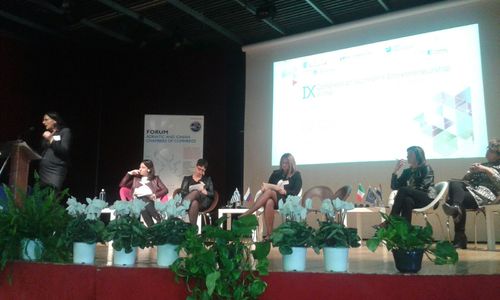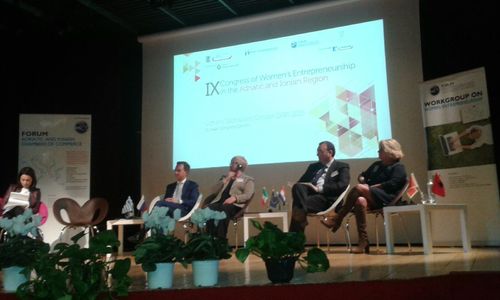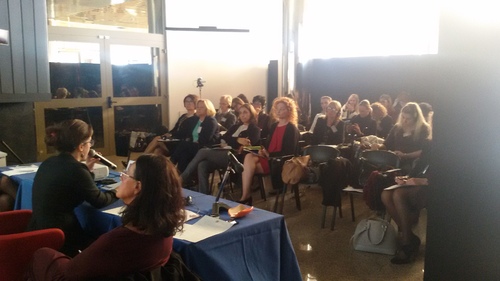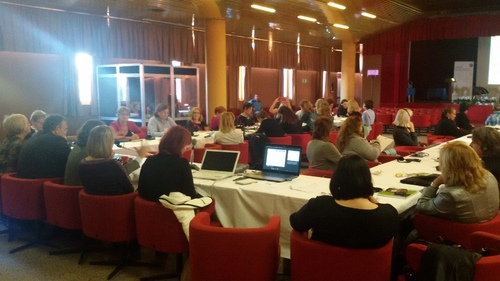9th Congress Women’s Entrepreneurship of Adriatic and Ionian Area, Lignano Sabbiadoro (UD) Italy, 18th 19th October 2015

The works of the 9th Congress of Women’s Enterprises of the Adriatic and Ionian Area within the framework of the AIC Forum theme-specific Workgroup, coordinated by the Split Chamber of the Economy, ended on Tuesday, 20th October 2015. The two-day meeting took place in the town of Lignano Sabbiadoro in the Friuli Venezia Giulia Region and were co-organized by the Udine Chamber of Commerce. It saw the participation of over 130 participants, including institutional representatives and women entrepreneurs coming from the entire area and especially from Croatia.
“Clusters and networking in women entrepreneurship” was the topic dealt with during the meeting, which highlighted the strong determination to work on networks and clusters in fields, like hospitality, the agricultural, food and wine sector, innovation and technology transfer, with the aim of making the difference and serving as a reference point for change and the growth of the entire Macroregion and as a lab for others.
The opening speeches, chaired by the journalist Alessandra Salvatori, started with the contribution by the mayor of Lignano Sabbiadoro Luca Fanotto. He was then followed by the President of the AIC Forum Rodolfo Giampieri, who stressed how having been granted the status of Macroregion presupposes a strong organization and the ability to implement integrated projects with high added value, within which networking between enterprises, especially those run by women, can provide the macroregional strategy with synthetic ability and a new problem-solving approach. The welcoming speech by the President of the Split Chamber of the Economy and coordinator of the AIC Forum workgroup for women’s entrepreneurship Katija Buličić was followed by the contribution by the Vice-president of the Udine Chamber of Commerce Clara Maddalena and the Vice-president of the Friuli Venezia Giulia Regional Board Sergio Bolzonello, who strongly believes in the possibility for the SMEs of the area to grow in size through the creation of networks between the research and the business world.
An extremely touching contribution full of motivation was pronounced by the representative of the European Economic and Social Committee Madi Sharma, who is an internationally renowned, especially in the field of women’s entrepreneurship. The aim of her speech was to inspire and motivate others to change. One of the sentences pronounced, which certainly made an impression, was “Life is a blank piece of paper – whatever you write on it you can achieve”.
The next speech was held by the Secretary-General of the Italian Union of Chambers of Commerce, Unioncamere,Tiziana Pompei, who highlighted how Unioncamere has for years worked for the promotion of women’s enterprises and the diffusion of the entrepreneurial spirit among women through the collection, analysis and monitoring of quarterly data on female businesses. This methodology is development tool at the same time, as only through statistics obtained from certain and reliable sources can specific development actions be planned. This view was shared by the Director of the Department for Industry of the Croatian Chamber of the Economy (i.e. the Croatian counterpart of Unioncamere)Tajana Kesić Šapić, started from the basic distinction between an idea and an innovation, only to go on and give a very inspiring and informative presentation regarding the meaning of innovations and new technologies and the support given by the CCE in this area. At the same time, she also highlighted that Croatia is one of the few countries in the Macroregion, besides Italy, who is already implementing its second Strategy for the development of women’s entrepreneurship and that the Croatian Chamber of Economy has since its very beginning supported the Association of Croatian Businesswomen, which is this year celebrating the twentieth anniversary of its foundation. The Secretary-General of the Udine Chamber of Commerce Maria Lucia Pilutti provided participants with an overview of female enterprises in Italy and in the Friuli Venezia Giulia Region. She then focussed on the support mechanisms made available by the Udine Chamber of Commerce for female businesses in their start-up phase. Also universities had their turn: the floor was then given to professor Anna Zilli who teaches at the Department of Legal Sciences of the University of Udine. Professor Zilli talked about the Agreement Protocol signed by the Udine Chamber of Commerce and the University of Udine for the promotion of a Database of female talents, i.e. a platform for the coming together of supply and demand of female talents, which gives women the chance to put forward their candidature and keep their CVs online and enterprises seeking for female candidates to find the right ones depending on their needs and characteristics.
Last but not Least, the session on innovation saw the participation of Mary Ann Rukavina Cipetić, who presented the first cluster of women’s enterprises, partnerships and associations in Croatia called KOLO. This is a unique best practice, which is furthermore closely related to the need to develop clusters in the area
Ms. Anna Fusari from the European Investment Bank was connected from Luxembourg via videoconference and illustrated participants the financing possibilities and tools that the bank makes available for SMEs.
The working session, which provided for an extremely interesting exchanges of views and information, saw the participation of the representatives of some Italian committees of women’s enterprises, specifically the President of the Committee for Women’s Enterprises of the Udine Chamber of Commerce Mariella Moschione, the President of the Padova Committee for Women’s Enterprises of the Padua Chamber of Commerce Maria Grazia Turolla, the Vice-president of the Committee for Women’s Enterprises of the Ancona Chamber of Commerce Erica Lorenzini, Confidi Friuli with its representative Paola Baldan, as well as Croatian women’s associations represented by the President of the Croatian Employer’s Association Gordana Deranja, then Silvana Vujnovic for the Croatian Ethical Bank andLorena Brgić from the Economic Department of the Istrian County.
The meeting was extremely interesting and offered plenty of useful insights, as well as the possibility to discuss several topics: access to capital, innovation support tools, the role of institutions for the promotion of women in business, trust in banks and ethical banks when it comes to the sustainable development of communities, and clusters
A significant contribution was furthermore made by the President of the Albanian Association of BusinesswomenFlutura Xhabija, who presented her association boasting a widespread presence all over Albania and provided participants with an overview of Albania women’s enterprises, including existing relations with chambers of commerce.
The following morning, which was the final day of the congress, was structured around the work of two theme-specific workgroups, one on women’s initiatives in the fields of agrofood, tourism, culture and the environment and the other on all-round innovation
Both workgroups discussed successful business cases and provided the ideal setting for the exchange of good practices, leading to models that can be uniformly applied within the Macroregion
Francesca Barnaba from Friuli Innovazione Udine, who is an expert in European project management, made a contribution at the workgroup on innovation, chaired by Elsa Bettella, who is a senior trainer for the establishment and development of women’s businesses. Ms. Bettella was very positive about the best practices shown: leading examples in the field of technology innovation, even in sectors that are generally considered to be male-dominated, like shipbuilding, the building industry, the study and use of alternative materials and the biomedical sector. Within this last sector, the Università Politecnica delle Marche and the businesswoman Alessandra Micozzi presented Bioerg, i.e. the first company in the Marche region and the fifth business in Italy to be financed through crowdfunding. Senior Trainer Bettella believes that the vision and creativity that women can bring about also in these fields are a form of innovation, i.e. the innovation of “taking care of”, as well as the increased propensity to share that goes hand in hand with more openness towards the economy of the future: in this case, the need was stressed for women – and institutions alike – to identify and organize more opportunities to meet and share experiences, thereby increasingly focussing on the need to “share”, “bring together” and never stop growing
The expert in the field of tourism and international cooperation and herself entrepreneur as owner of a start-upCécile Rousset coordinated the workgroup on tourism. Several experiences and ideas were discussed within this workgroup, with an initial contribution by Unioncamere policy advisor Marco Bonfante, who illustrated the direct and indirect financing possibilities available at European level. The works of the workgroup were rich in useful insights, good practices and innovation and addressed a large variety of sectors, ranging from agrofood tourism, cultural tourism, to food e-commerce, which is has only recently started and was explained by the entrepreneur Erica Lorenzini. The workgroup was furthermore the occasion to present the project called MedDiet – Mediterranean Diet and enhancement of traditional foodstuff – and the E-capital culture – Adriatic Start-up school, which both see the involvement of the AIC Forum as a partner (see the session on projects).
In the afternoon after the end of the works the Croatian delegation went from Lignano to Udine to visit the headquarters of Friuli Innovazione and learn about the services offered by this research facility, specifically about the ways in which services supporting new enterprises are provided. These include the Techno Seed business certificate incubator, which boasts a ten-year long experience and about fifty start-up enterprises that were supported during the first years of their life.
Sessione Plenaria:
- Rodolfo Giampieri, President of AIC Forum
- Maria Lucia Pilutti, General Secretary of Udine Chamber of Commerce (italian version)
- Anna Fusari, European Investment Bank (BEI)
- Mariella Moschione, President of the Commitee of Women Entrepreneurship of the Udine Chamber of Commerce
- Paola Baldan, Confidi Friuli
- Silvana Vujnovic eGoran Jeras, Etical Bank, Croatia (English version)
- Lorena Brgic, Acting Head of the Economy Department of the Istrian County
I Workgroup: Sustainable Tourism, agri-food and wine sector
- Marco Bonfante, Policy Advisor, Unioncamere Brussels (English version)
- Meddiet Project – Rodolfo Giampieri, President AIC Forum
- E-capital Culture – Adriatic Start-up School, Michele De Vita, Secretary General AIC Forum (English version)
- Marija Ribarić, Marytess d.o.o. (Croatian version)
- Sanja Vale Čupić, Adrinaut, brending & commerce
II Workgroup: Innovation and new technologies
